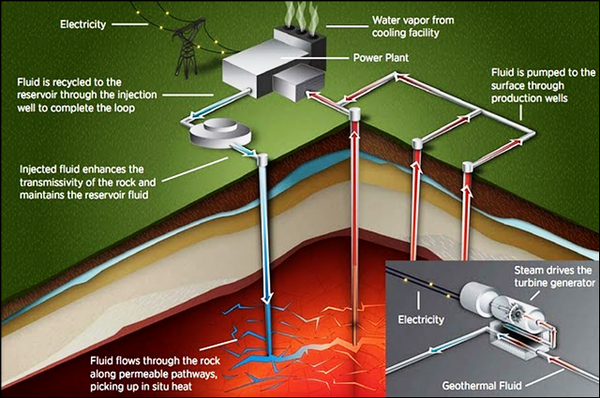Difference between revisions of "Geothermal"
| Line 1: | Line 1: | ||
==Key Stage 3== | ==Key Stage 3== | ||
| + | ===Meaning=== | ||
| + | '''Geothermal''' is an [[Energy Resource|energy resource]] that allows us to use the [[Thermal Energy Store|thermal energy]] underground in [[Volcano|volcanic]] regions to heat or to power [[Electrical Appliance|electrical appliances]]. | ||
| + | |||
| + | ===About Geothermal=== | ||
| + | : [[Geothermal]] is a [[Renewable Energy Resource|renewable energy resource]]. | ||
| + | : [[Geothermal]] has [[energy]] in the [[Thermal Energy Store|thermal energy store]] of [[rock]]s underneath the [[Earth]]'s surface. | ||
| + | |||
| + | ===Power=== | ||
| + | [[Geothermal]] can be used to provide hot water or generate electricity. | ||
| + | {| class="wikitable" | ||
| + | |- | ||
| + | |[[File:GeothermalPowerStationDiagram.png|center|600px]] | ||
| + | |- | ||
| + | | style="height:20px; width:200px; text-align:center;" |A [[diagram]] of a [[geothermal]] [[Thermal Power Station|power station]]. | ||
| + | |} | ||
| + | : 1. Cold water is pumped deep underground. | ||
| + | : 2. Water is heated as it passes through rocks underground. | ||
| + | : 3. Water turns to steam and passes down pipes to turn a turbine. | ||
| + | : 4. The turbine causes a generator to spin. | ||
| + | : 5. The generator makes an electrical current. | ||
| + | |||
| + | ====Advantages==== | ||
| + | *Extremely reliable (does not depend on sunlight or wind). | ||
| + | *Can be used to generate electrical power or to heat buildings directly. | ||
| + | *Does not cause pollution or significant environmental damage. | ||
| + | *No fuel cost. | ||
| + | |||
| + | ====Disadvantages==== | ||
| + | *Expensive to build when compared to how much money can be made selling the power. | ||
| + | *Can only be built in volcanic areas. | ||
| + | |||
| + | ==Key Stage 4== | ||
| + | {{#ev:youtube|https://www.youtube.com/watch?v=RWCnUE9pH04}} | ||
===Meaning=== | ===Meaning=== | ||
'''Geothermal''' is an [[Energy Resource|energy resource]] that allows us to use the [[Thermal Energy Store|thermal energy]] underground in [[Volcano|volcanic]] regions to heat or to power [[Electrical Appliance|electrical appliances]]. | '''Geothermal''' is an [[Energy Resource|energy resource]] that allows us to use the [[Thermal Energy Store|thermal energy]] underground in [[Volcano|volcanic]] regions to heat or to power [[Electrical Appliance|electrical appliances]]. | ||
Revision as of 16:25, 13 April 2019
Contents
Key Stage 3
Meaning
Geothermal is an energy resource that allows us to use the thermal energy underground in volcanic regions to heat or to power electrical appliances.
About Geothermal
- Geothermal is a renewable energy resource.
- Geothermal has energy in the thermal energy store of rocks underneath the Earth's surface.
Power
Geothermal can be used to provide hot water or generate electricity.
| A diagram of a geothermal power station. |
- 1. Cold water is pumped deep underground.
- 2. Water is heated as it passes through rocks underground.
- 3. Water turns to steam and passes down pipes to turn a turbine.
- 4. The turbine causes a generator to spin.
- 5. The generator makes an electrical current.
Advantages
- Extremely reliable (does not depend on sunlight or wind).
- Can be used to generate electrical power or to heat buildings directly.
- Does not cause pollution or significant environmental damage.
- No fuel cost.
Disadvantages
- Expensive to build when compared to how much money can be made selling the power.
- Can only be built in volcanic areas.
Key Stage 4
Meaning
Geothermal is an energy resource that allows us to use the thermal energy underground in volcanic regions to heat or to power electrical appliances.
About Geothermal
- Geothermal is a renewable energy resource.
- Geothermal has energy in the thermal energy store of rocks underneath the Earth's surface.
Power
Geothermal can be used to provide hot water or generate electricity.
| A diagram of a geothermal power station. |
- 1. Cold water is pumped deep underground.
- 2. Water is heated as it passes through rocks underground.
- 3. Water turns to steam and passes down pipes to turn a turbine.
- 4. The turbine causes a generator to spin.
- 5. The generator makes an electrical current.
Advantages
- Extremely reliable (does not depend on sunlight or wind).
- Can be used to generate electrical power or to heat buildings directly.
- Does not cause pollution or significant environmental damage.
- No fuel cost.
Disadvantages
- Expensive to build when compared to how much money can be made selling the power.
- Can only be built in volcanic areas.
